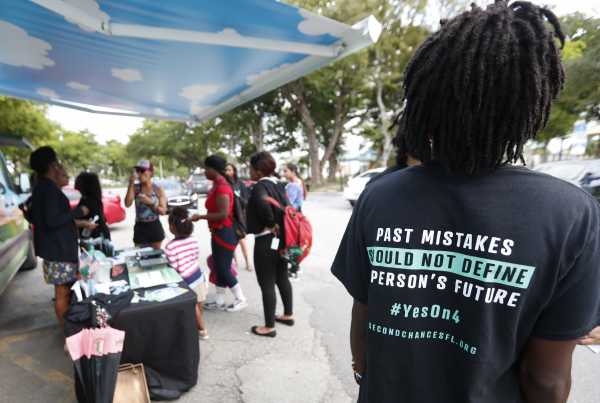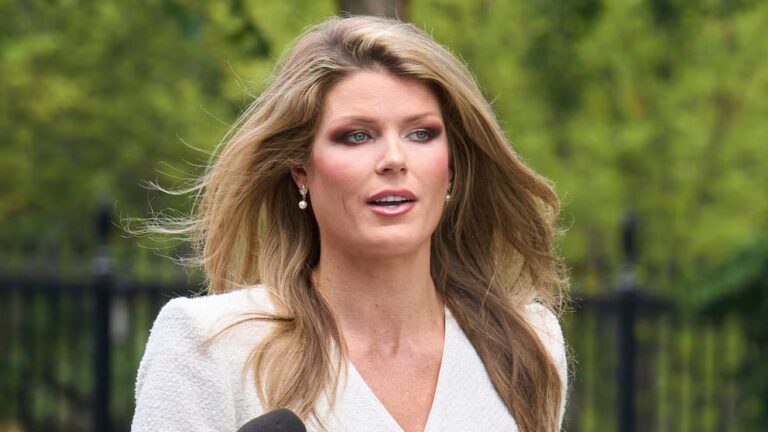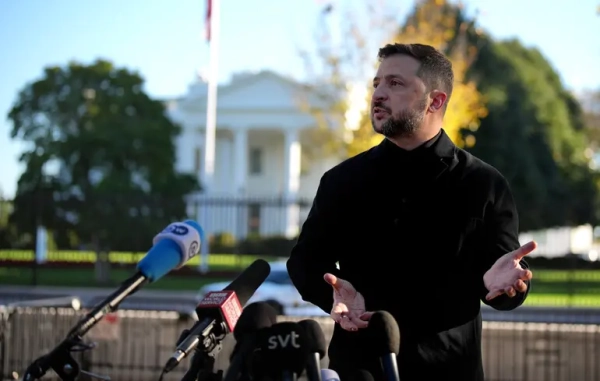
For people with felony convictions in Florida, the fight for voting rights wages on. The state is now facing four lawsuits over a newly enacted measure that critics say undermines one of the largest expansions of voting rights in recent decades and creates an unconstitutional “poll tax” for people previously disenfranchised due to felony records.
On Friday evening, Florida Gov. Ron DeSantis signed SB 7066, a bill that includes a measure requiring Florida residents with felony records to pay all financial penalties connected to their sentence — or have these penalties excused by a judge or converted to community service hours — before they can have their voting rights restored. The measure was passed by the Florida legislature at the beginning of May, following a contentious legislative session in which lawmakers debated how to implement Amendment 4, a popular 2018 ballot initiative that received 65 percent of the vote and restored voting rights to people “who have completed all terms of their sentence, including parole or probation,” except for those who were convicted of felony sexual offenses or murder.
Around 1.4 million Floridians were estimated to be eligible to regain voting rights under the amendment, which went into effect in January. But Republican legislators in the state argued that the law needed to be clarified, introducing measures that limited how many people would be able to immediately register to vote.
After two standalone bills on the matter came under scrutiny and attracted the ire of voting rights groups, lawmakers settled on SB 7066, a larger elections bill that was amended to include the financial obligations requirement.
Voting rights advocates say that requiring a person to pay all of their fines and fees before registering will deny voting rights to hundreds of thousands of Floridians with felony convictions — a group civil rights organizations are calling “returning citizens.” Estimates have suggested that more than half a million people will be affected by the new financial obligation-paying requirement, and many will need to wait years to finish payments before they can vote. Others may never be able to clear their debts, meaning that they will be permanently disenfranchised.
Critics say that the financial payment requirement is simply a modern day “poll tax”— a reference to the illegal practice of demanding voting fees that has historically been used to limit African Americans’ voting rights.
Due to the fact that people with felony records in the state are disproportionately likely to be black and have lower incomes, voting rights advocates say that the measure has a discriminatory impact on marginalized communities. In turn, several voting rights groups have filed lawsuits over the new law. The first comes from a coalition including the American Civil Liberties Union, the ACLU of Florida, and other civil rights groups; the second comes from lawyers representing Kelvin Jones, a black man unable to pay off the more than $50,000 he owes in fines and fees; the third lawsuit is from the Campaign Legal Center; and a fourth suit from the Southern Poverty Law Center was announced Monday. The first three suits have already been consolidated and are scheduled to be heard as one case by US District Court Judge Mark Walker.
Each suit differs slightly in the exact argument used to oppose the state’s new Amendment 4-related law, but all make the same basic claim: that the law is unconstitutional and will disenfranchise poor people and people of color with felony records, denying them the rights restored by the ballot amendment. “This law will disproportionately impact black Floridians with a felony conviction, who face the intersecting barriers of accessing jobs in a state with long-standing wealth and employment disparities,” Leah Aden, deputy director of litigation for the NAACP Legal Defense and Educational Fund, one of several groups involved in the ACLU lawsuit, explained in a statement.
Republican lawmakers in the state claim that their hands were tied and that the new law is a necessary clarification of the ballot amendment. But the civil and voting rights groups involved in the lawsuits argue that Florida is erecting unconstitutional hurdles to the ballot for a group that should be allowed to regain their voting rights. These groups add that clearing these hurdles could be especially difficult in Florida, a state that has a very complex system for dealing with court fines and fees.
Republican legislators say the new Amendment 4 law is a necessary clarification. New lawsuits say it’s unconstitutional.
Before Amendment 4 passed last year, Florida was one of a handful of states that prohibited people with felony records from regaining their voting rights after serving their sentence, a rule that dated back to the post-Civil War era and was initially passed to limit black voting power in Florida.
Prior to Amendment 4’s passage, Floridians who wanted to vote again had to petition a state parole board for the opportunity, a process that could take years and varied depending on who occupied the governor’s mansion. The state routinely rejected thousands of applications, leaving many people — a disproportionate number of them black — unable to vote.
Amendment 4 changed this by automatically allowing most people who had completed their sentences — except for those convicted of felony sexual offenses and murder — to register to vote.
In the weeks after Amendment 4’s passage, voting rights groups said that the amendment made sense as written and did not need additional clarification. But DeSantis and other Republican legislators disagreed, arguing that the amendment was vaguely worded and that the state needed to create guidelines that would help local elections supervisors unsure of who should be allowed to register. This led to the measure included in SB 7066.
In the past several months, critics of the measure have focused on the legislative proposal that people with felony records pay any “financial obligation arising from a felony conviction,” even those not directly connected to their original sentence. Advocates say that this is not only unfair to people hoping to be re-enfranchised by Amendment 4, it also clearly violates the intent of the voters who overwhelmingly approved the ballot measure in 2018. And in the four lawsuits filed, these groups add that the law is also unconstitutional, citing the stories of more than a dozen plaintiffs to explain how Floridians will be negatively affected by the law.
The first lawsuit, Gruver v. Barton, was filed by the ACLU, along with the ACLU of Florida, the NAACP Legal Defense and Educational Fund, and the Brennan Center for Justice at NYU Law. The groups joined together to represent 10 plaintiffs, all of whom argue that they will struggle to regain their voting rights now that Senate Bill 7066 is law. The lawsuit specifically argues that the law violates the 14th, 15th, and 24th Amendments of the US Constitution.
The law “will have a massive disenfranchising effect, and result in sustained, and likely permanent, disenfranchisement for individuals without means,” the lawsuit notes. It adds that the Florida law “creates two classes of returning citizens: those who are wealthy enough to vote and those who cannot afford to.”
The lawsuit says that the new law has an especially negative effect on black people in the state, who are more likely to be pushed into the state’s justice system and struggle with low incomes that would make paying off fines difficult, if not impossible.
Research from the Brennan Center for Justice, one of the groups in the lawsuit, has found that in the first few months after Amendment 4 went into effect in January, the state saw a significant surge in voter registration, much of it driven by black people recently re-enfranchised under Amendment 4. The group has also found that those who registered at that time reported incomes far lower than the state average.
“Our research shows that the people who have registered to vote under Amendment 4 are disproportionately black and low-income,” Myrna Pérez, director of the Brennan Center’s Voting Rights and Elections Program, said in a statement on Friday. “There can be no mistaking the racial and class implications of this regressive new legislation.”
Lawyers for Kelvin Jones, the 46 year-old plaintiff in the second lawsuit, note that their client has a disability and cannot work. They say that he will be unable to pay the more than $52,000 he owes the state. The lawsuit also notes that Jones “is unable to afford to pay an attorney to petition the courts to allow him to convert his court costs, fines, and/or fees to community service, and even if he did, he is unable to perform community service, without accommodations, due to his disability.”
The third lawsuit comes from the Campaign Legal Center, which is suing on the behalf of Bonnie Raysor, a 58-year-old white mother of four convicted on felony drug-related charges in 2010. Raysor was released from prison in 2011, but CBS News reports that it will take her until 2031 to pay off the roughly $4,300 she has in court fines and fees.
Her lawyers argue that it is unfair — and unconstitutional — for her and other low-income Floridians to be denied the vote until then. “The argument is actually pretty straightforward, and it’s taught in seventh grade civics,” Danielle Lang, the co-director of the Campaign Legal Center’s voting rights and redistricting program, told CBS News. “We can’t have a poll tax.” Like the suit brought by the ACLU and other groups, Raysor’s suit argues that the Florida law violates the 14th and 24th Amendments.
The fourth lawsuit, which was announced Monday by the Southern Poverty Law Center, also makes the case that the new amendment disproportionately disenfranchises poor people of color, violating the 8th, 14th, and 24th Amendments. But this suit focuses on the particular impact the law will have on poor black women in the state and cites how the law has affected its two civilian plaintiffs, Rosemary McCoy and Sheila Singleton. Both women have finished their sentences and registered to vote after Amendment 4 went into effect. But because they have hundreds of dollars in fines and fees to pay off and are also expected to pay thousands more in restitution, they will no longer be eligible to vote.
Lawyers for the SPLC say that the law will be especially harmful for women like McCoy and Singleton, who are struggling to find employment and will now also have to deal with paying off large debts in exchange for the franchise.
“In a state where poverty rates among children, women, and racial minorities remain disproportionately high, most especially among black women, the denial of voting rights based on one’s economic status is not only contrary to what true democracy looks like, but also feeds into widespread apathy and distrust of the political system,” Nancy Abudu, deputy legal director for voting rights at the SPLC, said on Monday.
The structure of Florida’s justice system could make enforcing this financial requirement a complicated process
Another point raised by the voting rights groups is that navigating the labyrinth of fines and fees could be especially difficult in Florida, which has become so reliant on financial charges levied against people in the justice system that criminal justice reform advocates call the state one of the worst practitioners of “cash register justice” in America. In 1998, Florida passed a constitutional amendment that requires that the court system be funded by these fines and fees.
And in 2010, an analysis from researchers at the Brennan Center found that fines and fees have become a top source of revenue for the state, noting that “since 1996, Florida [has] added more than 20 new categories of financial obligations for criminal defendants and, at the same time, eliminated most exemptions for those who cannot pay.”
Earlier this year, local Florida news outlet WLRN reported that more than “$1 billion in felony fines were issued between 2013 and 2018,” according to reports from a statewide group.
“Over that five-year period, an average of only 19 percent of that money was paid back per year,” the report noted. Part of the problem, apparently, is that some of these unpaid fines and fees can be sent to debt collection agencies, which can add charges that significantly increase the amount a person owes.
Another issue is that the measure doesn’t contain any information on how courts should handle the influx of people seeking to have financial obligations dismissed or converted to community service. It’s still unclear how people will be kept updated on the total amount they must repay, or how local elections officials will track who can and cannot register.
Even before the lawsuits were announced, voting rights groups said Florida was not prepared to help people looking to navigate this system.
In the lawsuit brought by the ACLU, the plaintiffs explain how the fees requirement has been confusing, with several parties noting that they were only told about the fees they owed after they had registered to vote. Voting rights groups fear that people will be penalized for registering when they were ineligible due to the state failing to alert them beforehand.
The groups involved in the lawsuits say that in creating new laws around Amendment 4, state lawmakers are undermining voting rights
Many of the groups involved in the recent lawsuits argue that with the measure’s financial obligations repayment requirement, the state has not only curbed the ability for those with felony records to reintegrate into society, it has also thwarted the will of the voters who passed Amendment 4 last November.
“By enacting Senate Bill 7066, the Florida legislature completely ignored and undermined the will of the people, including their own constituents who overwhelmingly supported Amendment 4,” the SPLC lawsuit notes.
And for the people who were intended to have their rights restored, the groups involved in the lawsuits argue that the measure functions as a modern-day “poll tax”— effectively forcing people to pay for their voting rights.
“The premise of your ability to vote should not be conditioned on your ability to pay,” Pérez, the Brennan Center voting rights director, explained to Vox in a May interview. “There is no dispute that this legislation is linking the fundamental right to vote to the ability to pay.”
Moving forward, advocates involved in the lawsuits say they will be working to get the financial obligation requirements of SB 7066 blocked by a court. In the meantime, other advocacy groups like the Florida Rights Restoration Coalition are working to register voters who are currently eligible, and have begun to raise money for a fund that can be used to help others pay off fines and fees.
As the legal challenges in Florida continue, those affected by the new law say they want nothing more than the ability to rebuild their lives and have a say in the politics and policies that affect them. “We work, we pay taxes, but we don’t have a voice in our communities,” McCoy, one of the women involved in the SPLC lawsuit, said in a statement. “We should have the right to hold our elected officials accountable and participate in our local political process.”
“I lost all my money, I lost everything,” she added. “I’m not going to let them take my right to vote.”
Sourse: vox.com






